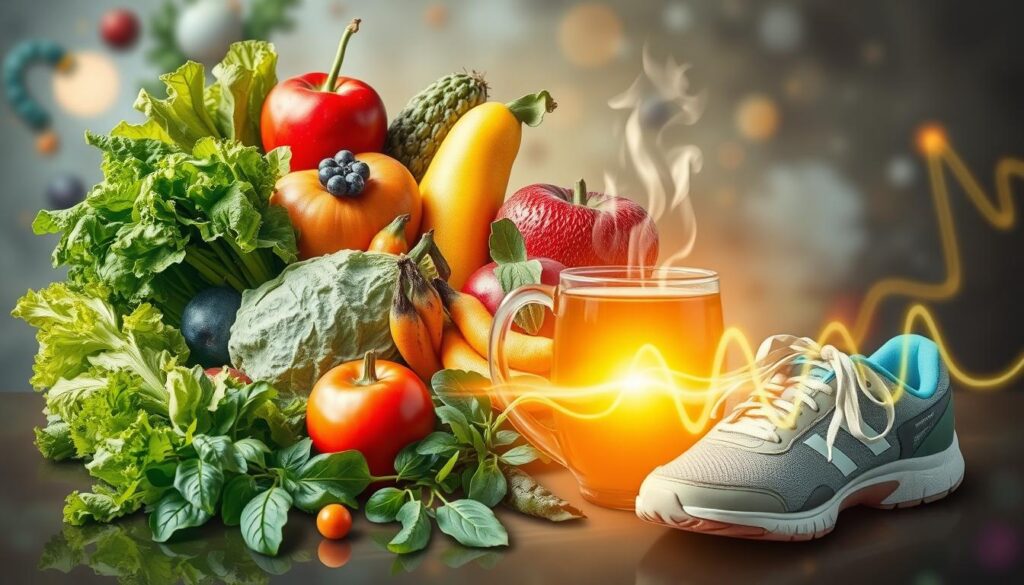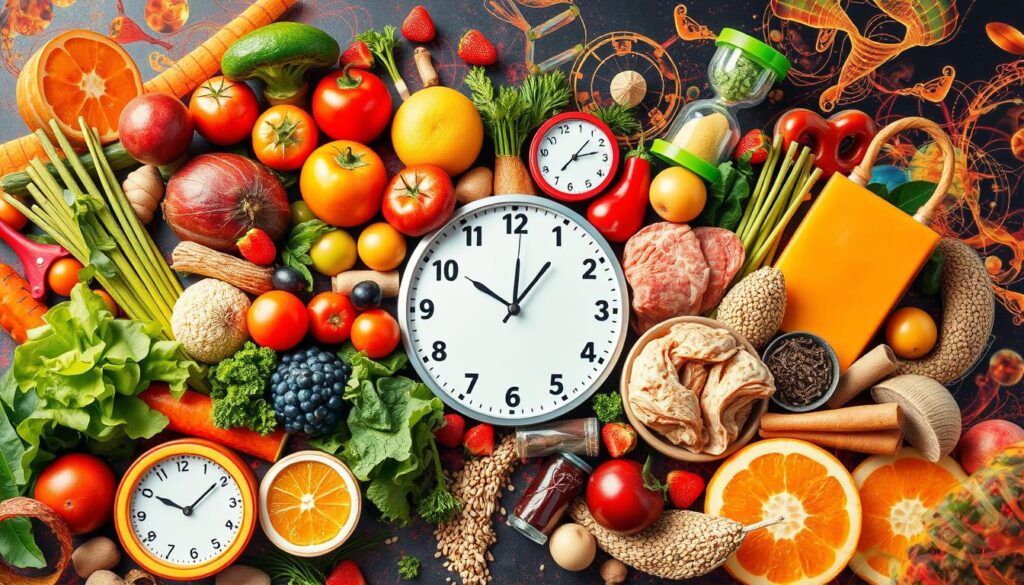Metabolism is like the engine of your body. It helps you burn calories and stay healthy. If you want to lose weight or feel better, boosting your metabolism is key. Luckily, there are many ways to do this.
Key Takeaways
- Protein, high-intensity interval training (HIIT), and strength training can significantly increase your metabolic rate.
- Proper meal timing and the inclusion of metabolism-boosting supplements like green tea and caffeine can also provide a metabolic edge.
- Factors like gender, age, and hormones play a role in your baseline metabolic function, but healthy lifestyle habits can help offset age-related declines.
- Maintaining a balanced diet and staying hydrated are essential for keeping your metabolism in top shape.
- Developing an understanding of how your metabolism works is the first step to optimizing it for weight management and overall wellbeing.
Understanding Metabolism: The Body’s Energy Factory
Metabolism is how your body turns food into energy. It’s like a factory inside you. It helps you breathe and move.
How Metabolism Affects Daily Energy Expenditure
Your body burns calories at a certain rate. This rate is called the basal metabolic rate (BMR). Things like age, diet, and sex can change your BMR.
The Science Behind Metabolic Processes
Your body turns carbohydrates, proteins, and fats into energy. Eating protein makes your metabolism go up more than carbs or fats.
Factors Influencing Metabolic Rate
Many things affect how fast your metabolism is:
- Age: It gets slower as you get older.
- Muscle mass: More muscle means a faster metabolism.
- Physical activity: Being active uses more energy.
- Nutrition: What you eat can change your metabolism.
- Hormones: Hormones like thyroid hormones affect it.
- Medical conditions and medications: Some health issues and meds can change it too.
Knowing how your metabolism works can help you stay healthy. It’s all about using your body’s energy wisely.
Why Your Metabolism Matters for Weight Management
Your metabolism is key for losing weight. A faster metabolism burns more calories, helping you reach your goals. Eating enough protein keeps your muscle mass, which helps your metabolism stay strong.
Creating a calorie deficit is key for losing weight. This means eating fewer calories than you burn. It’s important to eat healthy and enough to keep your metabolism balanced.
- Research shows night shift workers gain more weight. This shows how meal timing affects weight.
- Getting 7 to 9 hours of sleep helps with weight management. It lowers cortisol and improves decision-making.
- To gain one pound of fat, you need to eat 3,500 extra calories. This shows how much extra food is needed for weight gain.
The thermic effect of food is also important. This is when your body burns calories digesting food. Protein has a higher thermic effect than carbs and fats, helping with weight loss.
Natural supplements and foods can boost your metabolism. Caffeine slightly increases calorie burn, but the effect goes down as you get used to it. Green tea can burn an extra 100 calories a day, if you drink three cups a day. But, the effect of hot chilis on weight loss is still unclear.
Understanding your metabolism’s role in weight management is key. A balanced approach with healthy eating, meal timing, and exercise can boost your metabolism. This helps you reach your weight loss goals.
The Role of Gender and Age in Metabolic Function
Knowing how gender and age affect your metabolism is important. Men usually have a faster metabolism than women because of more muscle. As we get older, our metabolism slows down, which can lead to weight gain if we don’t change our habits.
Male vs Female Metabolic Differences
Men have more muscle, which burns more calories. This means they can eat more without gaining weight. Women, with more body fat, burn calories slower.
Age-Related Metabolic Changes
Our metabolism slows down with age. After 50, not exercising can cause muscle loss. Losing muscle makes it harder to lose weight and easier to gain it.
Hormonal Influences on Metabolism
Hormones control our metabolism. Thyroid hormones are key for a healthy rate. Low thyroid levels can slow metabolism and lead to weight gain. But, taking thyroid meds can help.
Using metabolism boosters like exercise, a good diet, and supplements can help. Knowing how your metabolism works helps you stay healthy. This is true for everyone, no matter their gender or age.
The Five Best Ways To Boost Metabolism
Boosting your metabolism is key to burning fat naturally. Simple lifestyle changes can help a lot. Let’s look at the five best ways to boost metabolism and reach your health goals.
- Exercise Regularly – High-intensity interval training (HIIT) boosts your metabolic rate. HIIT burns lots of calories and keeps your metabolism high after working out.
- Strength Train – Building lean muscle through resistance training boosts your metabolism. More muscle means more calories burned, even when resting.
- Eat Frequently – Eating small meals often keeps your metabolism going. Skipping meals, especially breakfast, slows it down.
- Consume Metabolism-Boosting Foods – Foods like protein, spicy peppers, and green tea boost your metabolism. They help burn calories and support health.
- Get Enough Sleep – Good sleep is key for a healthy metabolism. Aim for 7-9 hours each night to help your body and mind.
Focus on these five strategies to boost your metabolism. With effort and patience, you’ll see great results. A faster metabolism is worth the work.

“The key to a healthy metabolism is a balanced, nutrient-dense diet combined with regular physical activity and adequate rest.”
The Power of Protein in Metabolic Enhancement
Protein is a big help for your metabolism. It needs 20-30% of its energy to work. This means eating more protein can help you burn more calories all day.
Protein also helps keep your muscles strong when you lose weight. Keeping your muscles strong is key to a fast metabolism. Eating enough protein helps your muscles grow and repair. This boosts your thermogenesis enhancers.
Optimal Protein Timing and Sources
Eating protein at every meal is best. Good sources include eggs, lean meats, fish, dairy, and plant-based foods like legumes and tofu. Eating protein all day keeps your energy up and helps your muscles grow.
The Thermic Effect of Protein
Protein makes your body burn more calories than carbs and fats. Studies show eating 29% of your daily calories as protein can boost your metabolism. This is more than eating only 11% of your calories as protein.
Protein’s Role in Muscle Preservation
Keeping your muscles strong is key to a healthy metabolism, especially when you’re losing weight. Protein helps your muscles grow and repair. This stops you from losing muscle and keeps your metabolism high, helping you burn more calories even when you’re not moving.
Eating a variety of protein-rich foods can really boost your metabolism. By eating the right amount and timing of protein, you can use its thermic effect. This helps you keep your muscles lean and your metabolism healthy.
High-Intensity Interval Training and Metabolism
High-intensity interval training (HIIT) can really boost your metabolism. It involves short, intense workouts followed by rest or low-intensity exercise. This not only burns calories during the workout but also keeps your metabolism high after.
HIIT works by making your body burn fat and use glucose for energy better. It can make blood sugar levels go up, but it’s good for your metabolism overall.
HIIT helps your metabolism by making more AMPK, an enzyme that helps use glucose. This can make your body clear glucose from blood better and lower insulin resistance risk.
HIIT also makes catecholamines, hormones that increase glucose use and production. This can keep burning calories for hours after your workout.
To get the most from HIIT, try different workout styles like Tabata or the 10-by-1 method. These can improve your metabolism, increase aerobic capacity, and lower blood pressure.
Consistency is key for HIIT’s benefits. Do HIIT workouts a few times a week. Combine them with healthy eating and sleep for better metabolism.
Strength Training: Building Metabolically Active Muscle
Muscle burns more calories than fat. Strength training helps build lean muscle. This boosts your metabolic rate.
Best Exercises for Metabolic Boost
Choose compound exercises for the best results. These work many muscles at once. Some top picks are:
- Squats
- Deadlifts
- Bench presses
- Rows
These exercises build muscle and boost your heart rate. They help you burn more calories during and after working out.
Recovery and Muscle Growth
Good recovery is key for muscle growth. Get enough sleep, drink water, and eat protein. Combining resistance training with a protein-rich diet can lead to increased lean mass and a higher resting metabolic rate.
By doing these strength training exercises and focusing on recovery, you can increase your metabolic rate.
Strategic Meal Timing and Metabolic Health
Meal timing affects your metabolism a lot. Eating often helps keep hunger and fullness steady. But eating too little can slow down your metabolism.
Guidelines say women should eat 1,600-2,400 calories a day. Men should eat 2,000-3,000 calories. Eating foods rich in nutrients and avoiding snacks at night helps your metabolism.
“Chrononutrition” is a new idea. It links our body clocks, food, and metabolism. Eating early can make your body work better.
But skipping meals can be tricky. Some studies say eating more at breakfast helps you lose weight. It also makes you feel full longer.
| Meal Timing Factors | Impact on Metabolism |
|---|---|
| Eating regular meals and snacks | Helps prevent extreme swings in hunger and fullness, supports metabolic function |
| Consuming too few calories | Can cause metabolism to slow down as the body tries to conserve energy |
| Focusing on nutrient-dense foods | Supports metabolic health and maintenance of a healthy calorie deficit for weight loss strategies |
| Avoiding late-night snacking | Helps support optimal metabolic function |
| Consuming a larger portion of daily calories at breakfast | May lead to greater weight loss and improved satiety compared to eating more at dinner |
Knowing how meal timing affects your metabolism helps. You can make choices that support your health and goals.

“Meal timing contributes to the regulation of metabolic state and body weight.”
Natural Supplements and Metabolism Boosters
Natural supplements and thermogenic foods can boost your metabolism. Green tea has caffeine and catechins. These can help you burn more calories.
Spicy foods like chili peppers also help. They can make you burn about 50 calories more each day. Combining these with other strategies can help you lose weight.
Always talk to a doctor before taking new supplements or changing your diet. They can make sure it’s safe for you. This way, you can use natural metabolism boosters effectively.


A Life-Changing Experience with This Weight Loss Supplement (Nagano Tonic)
I’ve always struggled with finding a weight loss solution that actually works for me. Like many, I’ve tried numerous diets, exercise routines, and supplements over the years—some worked for a short time, but nothing ever gave me long-term results. That was until I decided to try the weight loss supplement I found : Link to the Supplement.
From the moment I started using it, I noticed a difference. Not only did I feel more energized, but my cravings also became more manageable. The best part? I started seeing results much quicker than I anticipated! Over the course of just a few weeks, I noticed a significant reduction in belly fat and overall weight loss that I hadn’t been able to achieve before.
What makes this supplement stand out from all the others I’ve tried is how it supports me in my daily routine without any jitters or energy crashes. I’m able to stay focused and motivated, which has made it easier to stay on track with my diet and exercise plan.
This product truly exceeded my expectations, and I feel more confident and healthier than ever before. If you’re struggling with your weight loss journey like I was, I highly recommend giving this supplement a try. It’s been a game-changer for me, and I’m sure it can work wonders for you too!
Contant Them on email .. tonicnagano50@gmail.com
I’ve tried so many weight loss products over the years, but nothing worked like this supplement! Since I started using it, I’ve noticed a big difference in my energy levels and appetite control. In just a few weeks, I’ve lost weight and feel so much better. It’s been easy to stick with, and the results speak for themselves. Highly recommend this to anyone looking to make a real change!
wasn’t sure what to expect, but this weight loss supplement has really impressed me! After just a few weeks of use, I’ve already dropped a few pounds and feel more motivated to stay active. It’s helped curb my cravings and boosted my energy throughout the day. I’m excited to keep going and see even better results. Definitely worth trying!
Reach them on tonicnagano50@gmail.com
I was skeptical at first, but this supplement has truly made a difference in my weight loss journey. I’ve lost weight without feeling deprived or sluggish. My cravings are under control, and I feel more confident in my body. It’s easy to incorporate into my daily routine, and the results speak for themselves. I’m so glad I gave it a try!
Thanks David, i do use the link to make my purchase. you can get too here http://surl.li/iasppy
This Nagano Tonic has been amazing! In just a few weeks, I’ve lost weight, feel more energized, and my cravings are under control. Highly recommend it!
Thats the link to purchase http://surl.li/iasppy